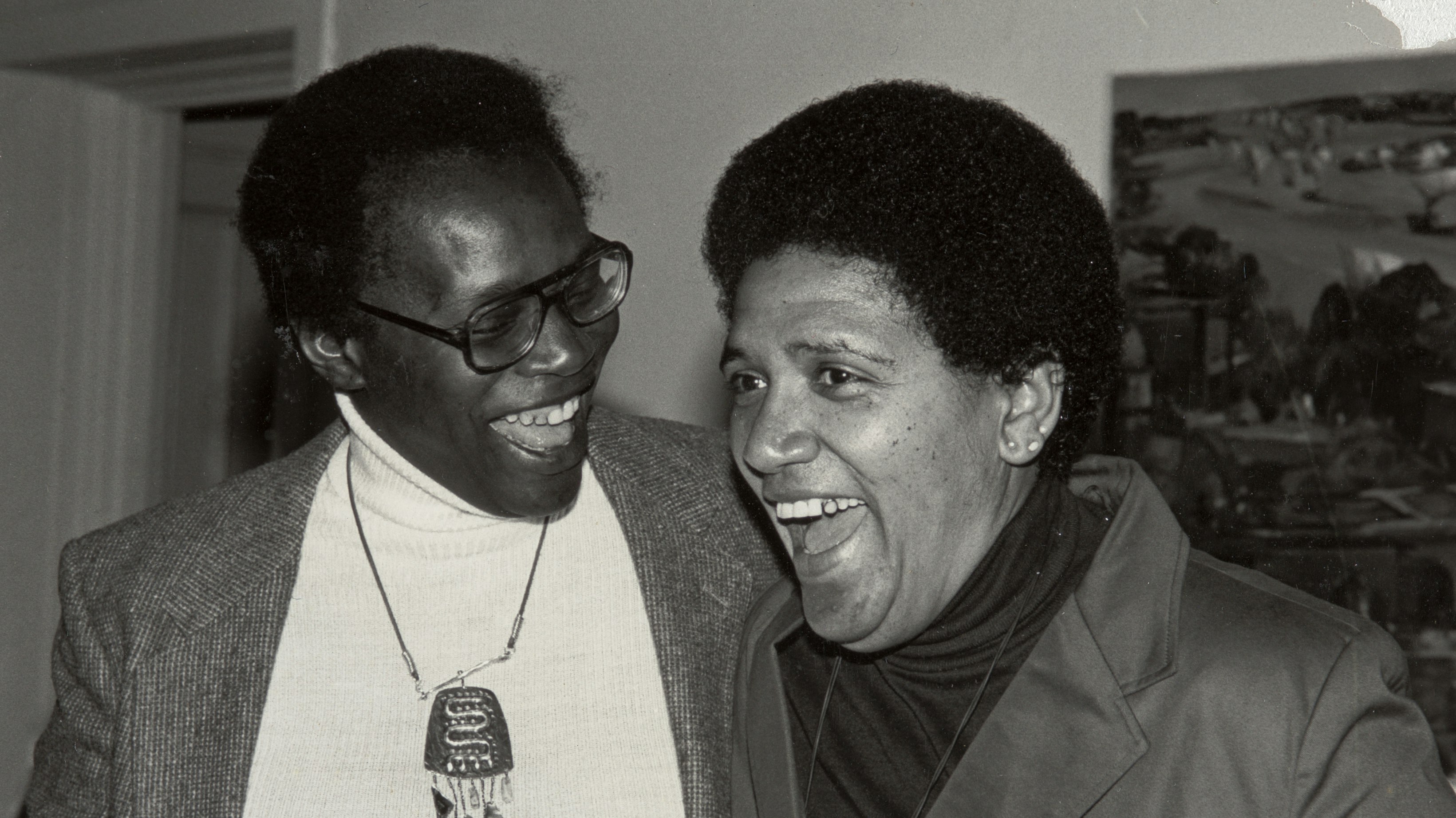Audre Lorde Reads "Afterimages"

The poetry of Audre Lorde (1934–1992) often explores the tensions and joys of her overlapping identities as a black woman, a feminist, and a lesbian.
In the introduction to this 1981 reading Lorde addresses these issues of intersectionality, saying to the women in the crowd, "I am also very, very conscious of those things which separate us, of the causes, of anger, and of the reasons why we do not hear each other when we do not hear each other."
"Afterimages" comes from a set of poems called "Women in Rage," and it centers on the story of Emmett Till, a 14-year-old black boy who was brutally murdered in Mississippi in the summer of 1955.
Listen to audio of Audre Lorde reading “Afterimages”
For research tips and additional resources, view the Hear Black Women's Voices research guide.
[start of track]
[Audre Lorde speaking]
This poem is dedicated to each of you and to Emmett Till, who I hope is a name that is familiar to at least some of you in this room of over five hundred women.
Afterimages
[pause]
However the image enters
its force remains
my eyes are
rockstrewn caves where dragonfish evolve
wild for life, relentless and acquisitive
learning to survive
where there is no food
my eyes are always hungry
and remembering
however the image enters
its force remains.
A white woman stands bereft and empty
a black boy hacked into a murderous lesson
recalled in me forever
like a lurch of earth on the edge of sleep
etched into my visions
food for dragonfish that learn
to live upon whatever they must eat
the fused images beneath my pain.
[pause]
The Pearl River floods through the streets of Jackson
A Mississippi summer televised.
Trapped houses kneel like sinners in the rain
a white woman climbs from her roof to a passing boat
her fingers tarry for a moment on her chimney
now awash
tearless, no longer young, she holds
a tattered baby's blanket in her arms.
In the flickering afterimage of this nightmare rain
a microphone
thrust up against her flat bewildered words
“we jest come from the bank yestiddy
borrowing money to pay the income tax
now everything's gone. I never knew
it could be so hard.”
Despair weighs down her voice like Pearl River mud
caked around the edges
her pale eyes scan the camera for help or explanation
and then unanswered
she shifts her search across the watered street, dry-eyed
“hard,” she says, “but not this hard.”
And two tow-headed children hurl themselves against her
hanging upon her coat like mirrors
until a man with ham-like hands pulls her aside with a snarl
“She ain't got nothing more to say!”
and that lie hangs in his mouth
like a shred of rotting meat.
Part 3
I inherited Jackson, Mississippi.
For my majority it gave me Emmett Till
his 15 years puffed out like bruises
on plump boy-cheeks
his only Mississippi summer
whistling a 21 gun salute to Dixie
while a white girl passed him in the street
and he was baptized my son forever
in the midnight waters of the Pearl.
His broken body is the afterimage of my 21st year
when I walked through a northern summer
my eyes averted
from each corner's photographies
newspapers protest posters magazines
Confidential, Police Story, True
the avid insistence of detail
pretending insight or information
the length of gash across the dead boy's loins
his grieving mother's lamentations
the severed lips, how many burns
his gouged out eyes
sewed shut upon the covers
louder than life
all over
the veiled warning, the secret relish
of a black child's mutilated body
fingered by street-corner eyes
bruise upon livid bruise
and wherever I looked that summer
I learned to be at home with children's blood
with savored violence
with pictures of black broken flesh
used, crumpled, discarded
lying amid the sidewalk refuse
like a raped woman's face.
A black boy from Chicago
whistled on the streets of Jackson,
tested what he'd been taught was a manly thing to do
his teachers
ripped out his eyes his sex his tongue
and flung him to the Pearl weighted with stone
in the name of white womanhood
they took their aroused honor
back to Jackson
and celebrated in a whorehouse
the double ritual of white manhood
confirmed.
[pause]
Part 4
“If earth and air and water do not judge them who am I
to refuse a crust of bread?”
Emmett Till rides the crest of the Pearl, whistling
24 years his ghost lay like the shade of a raped woman
and a white girl has grown older in costly honor
(what did she pay to never know the price?)
now the Pearl River speaks its muddy judgment
and I can withhold my pity and my bread.
"Hard,” she says, “but not this hard.”
Her face is flat with resignation and despair
with ancient and familiar sorrows
a woman surveying her crumpled future
as the white girl besmirched by Emmett's whistle
never allowed her own tongue
without power or conclusion
unvoiced
she stands amid the...she stands adrift in the ruins of her honor
and a man with a face of an executioner
pulls her away.
“Hard, but not this hard.”
Within my eyes
the flickering afterimage of a nightmare rain
a woman wrings her hands
beneath the weight of agonies remembered
I wade through other summer ghosts
betrayed by visions
hers and my own
becoming dragonfish to survive
the horrors we are living
with tortured lungs
adapting to breathe blood.
A woman measures her life's damage
my eyes are caves, chunks of etched rock
tied to the ghost of a black boy
whistling
crying and frightened
her tow-headed children cluster
like little mirrors of despair
their father's hands upon them
and soundlessly
a woman begins to weep.
[applause]
[end of track]







